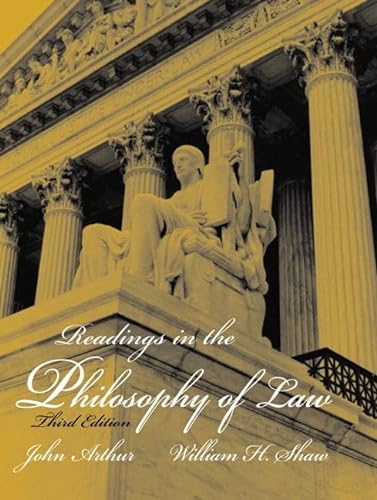Readings in the Philosophy of Law (3rd Edition) - Softcover

"synopsis" may belong to another edition of this title.
PREFACE
We have been gratified by the reception that the first two editions of Readings in the Philosophy of Law have received. Each edition went through several printings, and many friends and colleagues have written to offer comments and suggestions. Like its predecessors, this new edition reflects the conviction that legal philosophy is its own subject, best approached by paying attention to how the law is organized and to the particular issues it raises. The book is, therefore, not a book in applied ethics, nor one in political philosophy; it is its own subject with its own fascinating set of problems.
This text can be used in many different ways. It is designed so that each section stands on its own, enabling instructors to address the topics in any order and to skip certain topics if they wish. Readers familiar with the earlier editions will find in the third edition much continuity in the themes and issues treated. Believing it to be the soundest organizational structure, we continue to follow the traditional divisions among different fields of law. Initial sections on legal practice, legal reasoning, and the nature of law are followed by discussions of criminal, tort, contract, property, and constitutional law. These make up the major subdivisions in the book.
We have also expanded and redefined the early sections to deal with an array of topics either ignored or inadequately covered in other texts. In particular, we found it useful to begin undergraduate courses in philosophy of law with discussions of legal practice, the adversary system, the rule of law, obedience to law, and legal reasoning. Many philosophy of law students plan to attend law school, so these topics are a natural way to introduce them to the subject. We have been especially careful in selecting this introductory material to use readings that are accessible and interesting to discuss. The introductory section, "The Practice of Law," brings together four widely different viewpoints on the role and responsibilities of lawyers in an adversary system, while the readings on the rule of law focus on the practical problem of how to deal legally with people who worked with a previous, Nazi-like regime.
Readers will also notice many other new topics and essays in this edition. Part II, "The Nature of Law," now includes greatly expanded discussions of "Law and Economics" as well as "Critical Legal Theory and Feminist jurisprudence." Material on criminal law now includes an essay on the O. J. Simpson trial, jury nullification, and racial politics, along with readings on the battered woman's defense and the cultural defense in criminal cases. Part V, on constitutional law, has also been revised and expanded. It now includes more focused discussions of the justification of judicial review and the nature of constitutional interpretation, as well as an essay comparing the American understanding of constitutionalism with that of the French and British. We have added an essay and cases on religious freedom. The last section, "Equality and the Constitution," begins with two new essays on the ideal of equality itself; it also includes new cases on sexual harassment and hate speech.
While seeking to present the readings in a coherent and interrelated format, we have at the same time sought to provide a textbook with ample resources to allow a variety of different courses to be taught, in different ways, and to different student audiences. These and related editorial decisions grow out of our experience in teaching courses in philosophy of law at several colleges and universities, both private and public, to undergraduates with varying degrees of philosophical background and academic preparedness. One of us teaches philosophy of law to more than two hundred mainly lower-level students each year.
Philosophy of law is not a subject that can be made simple, but it can be made more accessible and more engaging to undergraduates than it has been in the past. Accordingly, we have endeavored to provide readings that students will find stimulating, yet that do justice to the subtlety and complexity of the philosophical problems in this field. We provide short introductions before each reading selection, and questions for review and discussion after each selection. These should enable even beginning students to follow the major arguments, at least in broad outline. In addition, we have edited the essays and cases with great care and abridged many of the readings from the previous edition in order to keep the focus sharply on the most relevant and important issues, avoiding needless technicality, immaterial digressions, and recondite issues.
John Arthur
William H. Shaw
"About this title" may belong to another edition of this title.
- PublisherRoutledge
- Publication date2001
- ISBN 10 013027741X
- ISBN 13 9780130277411
- BindingPaperback
- Edition number3
- Number of pages668
- Rating
Buy New
Learn more about this copy
Shipping:
US$ 5.66
Within U.S.A.
Top Search Results from the AbeBooks Marketplace
READINGS IN THE PHILOSOPHY OF LA
Book Description Condition: New. New. In shrink wrap. Looks like an interesting title! 2.07. Seller Inventory # Q-013027741x

